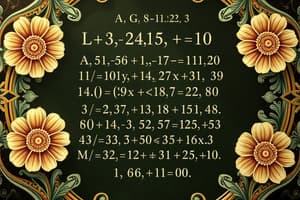Podcast
Questions and Answers
What is a variable?
What is a variable?
- A value that is always constant
- A letter that can represent a number that changes (correct)
- A fixed number with no value
- A term only used in geometry
What is a constant?
What is a constant?
A number that has a set value and is not next to a variable.
What is a coefficient?
What is a coefficient?
A number that is next to a variable.
What does distribution refer to in mathematics?
What does distribution refer to in mathematics?
What does combining like terms mean?
What does combining like terms mean?
What is the independent variable represented by in equations?
What is the independent variable represented by in equations?
What does Y represent in functions?
What does Y represent in functions?
An inequality is a mathematical sentence that contains less than or greater than.
An inequality is a mathematical sentence that contains less than or greater than.
What does 'greater than' signify in a graph?
What does 'greater than' signify in a graph?
What does 'less than or equal to' indicate?
What does 'less than or equal to' indicate?
What is the definition of a function?
What is the definition of a function?
What is a linear function?
What is a linear function?
What is the quadratic function?
What is the quadratic function?
What is the Quadratic Formula?
What is the Quadratic Formula?
What does radical mean in mathematics?
What does radical mean in mathematics?
What is the meaning of 'tangent'?
What is the meaning of 'tangent'?
Flashcards are hidden until you start studying
Study Notes
Algebra Concepts
- Variables: Represent numbers that change, commonly denoted as x, y, or other letters.
- Constants: Fixed values, not associated with variables.
- Coefficients: Numbers directly adjacent to variables, indicating multiplication.
Operations and Functions
- Distribution: A process where a number outside parentheses multiplies all terms within the parentheses.
- Combining Like Terms: The method of simplifying algebraic expressions by grouping similar terms.
- Independent Variable (X): Represents inputs in equations; can vary independently.
- Dependent Variable (Y): Represents outputs in equations; changes in response to the independent variable.
Inequalities and Relations
- Inequality: A statement involving less than, greater than, or equivalent expressions.
- Greater Than and Less Than: Represented with open circles on a number line.
- Greater Than or Equal To & Less Than or Equal To: Indicated with closed circles, showing inclusive limits.
Graphing and Functions
- Relation: Composed of ordered pairs; includes an independent and a dependent variable.
- Function: A special relation where each X value corresponds to only one Y value, tested using the vertical line test.
- Ordered Pair: Coordinates used to designate points in a coordinate plane.
Types of Functions
- Linear Function: Graph results in a straight line, expressed as Y = MX + B.
- Quadratic Function: Formed as y = x², typically creating a parabolic shape.
- Solutions to a Quadratic: Referred to as roots, x-intercepts, or zeros.
Systems and Equations
- System of Linear Equations: Involves two or more linear functions that may have zero, one, or infinitely many solutions.
Special Terms in Algebra
- Radical: Equivalent to taking the square root of a number.
- Axis of Symmetry: A line that divides a shape or graph into two mirrored halves.
- Vertex: The point at which a quadratic function achieves its maximum or minimum value.
Advanced Concepts
- Binomial Theorem: Provides the coefficients of terms in polynomial expansions.
- Quadratic Formula: Used for solving quadratic equations, represented as b ± √(b² - 4ac) / 2a.
- FOIL Method: A technique for multiplying two binomials, standing for First, Outer, Inner, Last.
- Difference of Squares: An algebraic identity defined as b² = (a - b)(a + b).
Trigonometric Functions
- Imaginary Number: Indicated by a cursive i, used within square root expressions.
- Tangent: Defined as opposite side over adjacent side in a right triangle.
- Cosine: Ratio of the adjacent side over the hypotenuse.
- Sine: Ratio of the opposite side over the hypotenuse.
Studying That Suits You
Use AI to generate personalized quizzes and flashcards to suit your learning preferences.




